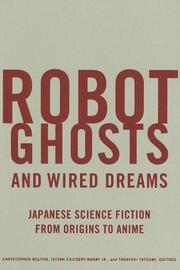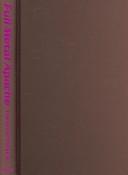| Listing 1 - 6 of 6 |
Sort by
|
Book
ISBN: 3039214225 3039214217 Year: 2019 Publisher: MDPI - Multidisciplinary Digital Publishing Institute
Abstract | Keywords | Export | Availability | Bookmark
 Loading...
Loading...Choose an application
- Reference Manager
- EndNote
- RefWorks (Direct export to RefWorks)
Mike Mosher’s “Some Aspects of Californian Cyberpunk” vividly reminds us of the influence of West Coast counterculture on cyberpunks, with special emphasis on 1960s theoretical gurus such as Timothy Leary and Marshall McLuhan, who explored the frontiers of inner space as well as the global village. Frenchy Lunning’s “Cyberpunk Redux: Dérives in the Rich Sight of Post-Anthropocentric Visuality” examines how the heritage of Ridley Scott’s techno-noir film
n/a --- virtual reality --- Tobi Hirotaka --- collage --- cyberpunk --- co-productions --- virtual worlds --- European cinema --- reception history --- Metropia --- transnational cinema --- layers --- manga --- cinematism --- Lo Tek --- audience --- 2000s --- techno-Orientalism --- outlaw technologist --- YLEM artists using science and technology --- animation --- Masaki Gor? --- “rich sight” --- Germany --- extraterritorial --- proscenium views --- care --- Japanese science fiction --- United States --- post-utopia --- comics --- flattened screens --- William Gibson --- science fiction --- animatism --- post-apocalyptic narrative --- genre --- SCAN --- HyperCard --- bOING bOING --- nostalgia --- global capitalism --- virtual idol --- MONDO 2000 --- Timothy Leary --- Walter Benjamin --- visuality --- fractal space --- Marshall McLuhan --- Renaissance --- Hyperart Thomasson --- Pattern Recognition --- dystopia --- Kowloon Walled City --- participatory aesthetics --- Guerrilla Games --- translation --- intertextuality --- nuclear politics --- end of history --- Horizon: Zero Dawn --- detritus --- Blade Runner --- "rich sight"

ISBN: 9780816649730 0816649731 9780816649747 081664974X Year: 2007 Publisher: Minneapolis, Minn. University of Minnesota Press
Abstract | Keywords | Export | Availability | Bookmark
 Loading...
Loading...Choose an application
- Reference Manager
- EndNote
- RefWorks (Direct export to RefWorks)
Since the end of the Second World War--and particularly over the last decade--Japanese science fiction has strongly influenced global popular culture. Unlike American and British science fiction, its most popular examples have been visual--from Gojira' (Godzilla)' and Astro Boy' in the 1950s and 1960s to the anime masterpieces Akira' and Ghost in the Shell' of the 1980s and 1990s--while little attention has been paid to a vibrant tradition of prose science fiction in Japan. Robot Ghosts and Wired Dreams' remedies this neglect with a rich exploration of the genre that connects prose science fiction to contemporary anime. Bringing together Western scholars and leading Japanese critics, this groundbreaking work traces the beginnings, evolution, and future direction of science fiction in Japan, its major schools and authors, cultural origins and relationship to its Western counterparts, the role of the genre in the formation of Japan's national and political identity, and its unique fan culture. Covering a remarkable range of texts--from the 1930s fantastic detective fiction of Yumeno Kyûsaku to the cross-culturally produced and marketed film and video game franchise Final Fantasy'--this book firmly establishes Japanese science fiction 'as a vital and exciting genre. Contributors: Hiroki Azuma; Hiroko Chiba, DePauw U; Naoki Chiba; William O. Gardner, Swarthmore College; Mari Kotani; Livia Monnet, U of Montreal; Miri Nakamura, Stanford U; Susan Napier, Tufts U; Sharalyn Orbaugh, U of British Columbia; Tamaki Saitô; Thomas Schnellbacher, Berlin Free U. Christopher Bolton is assistant professor of Japanese at Williams College. Istvan Csicsery-Ronay Jr. is professor of English at DePauw University. Takayuki Tatsumi is professor of English at Keio University.
Fiction --- Film --- Japan --- J6848 --- J5930 --- J5509 --- J6839 --- Science fiction, Japanese --- -Japanese science fiction --- Japanese fiction --- Japan: Media arts and entertainment -- anime --- Japan: Literature -- modern fiction and prose (1868- ) --- Japan: Literature -- theory, methodology and philosophy --- Japan: Media arts and entertainment -- cinema --- History and criticism --- History and criticism. --- -Japan: Media arts and entertainment -- anime --- Japanese science fiction
Multi
ISSN: 10798072 ISBN: 1929512333 Year: 1995 Publisher: Vashon Island: Paradoxa,
Abstract | Keywords | Export | Availability | Bookmark
 Loading...
Loading...Choose an application
- Reference Manager
- EndNote
- RefWorks (Direct export to RefWorks)
Paradoxa publishes articles on genre literature: science fiction, horror, mysteries, children's literature, romance, comic studies, the fantastic, best sellers, the occult, westerns, oral literature, and more.
Book
ISBN: 9780816654543 0816654549 9780816654550 0816654557 Year: 2012 Publisher: Minneapolis University of Minnesota Press
Abstract | Keywords | Export | Availability | Bookmark
 Loading...
Loading...Choose an application
- Reference Manager
- EndNote
- RefWorks (Direct export to RefWorks)
A young poet, Who May, pens one disturbing poem after another until he creates a poem that can kill, which sparks a "magic poem plague" when copies are mailed to all of his friends.

ISBN: 0822337622 0822388014 Year: 2006 Publisher: Duke University Press
Abstract | Keywords | Export | Availability | Bookmark
 Loading...
Loading...Choose an application
- Reference Manager
- EndNote
- RefWorks (Direct export to RefWorks)
Digital

ISBN: 9781785330049 Year: 1999 Publisher: New York; ; Oxford Berghahn Books
Abstract | Keywords | Export | Availability | Bookmark
 Loading...
Loading...Choose an application
- Reference Manager
- EndNote
- RefWorks (Direct export to RefWorks)
| Listing 1 - 6 of 6 |
Sort by
|

 Search
Search Feedback
Feedback About UniCat
About UniCat  Help
Help News
News